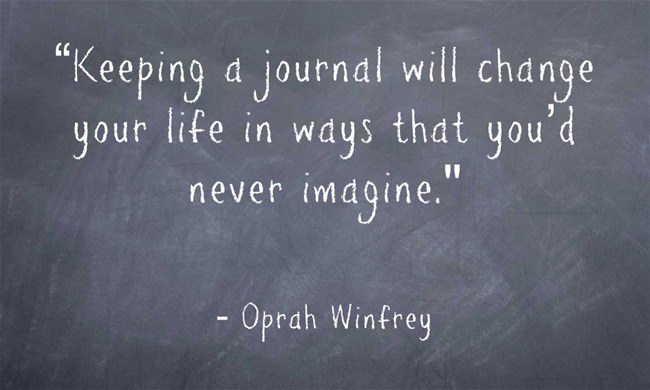April 1st, 2018 •
Comments Off on Adrenal Fatigue Coach Assignment: Use A Journal

Jim Rohn has over the years encouraged people in search of the good life to make use of a journal. The effects journals can have over our life can be astonishing.
But instead of finding new answers to life, and tracking your recovery from Adrenal Fatigue a journal can open a floodgate of new questions such as:
- What should I write?
- Should I only write about my recovery?
- How often should I write?
- What kind of journal is best?
- Is spelling important?
The purpose of this article is not to just explore the incredible value of recording your recovery progress, and in general, your life’s experiences but also to examine the many uses and methods of keeping a journal. Hopefully when you reach the end of this article your questions are answered and you will be confidently on your way of a new adventure with the vehicle of pen and paper.
A Journal Is Your Book
An important thing to understand about a journal is, that it is YOUR book. And because it is your book, you are the one who must select the size and style you feel most suits your needs and personal preferences. Just like your favorite armchair, a journal must be comfortable enough that you want to go to it often. You will probably find yourself experimenting with a lot of different journals over the years as your needs change. There is a variety of journals out there such as
- Journals with blank pages
- Journals with line pages
- Little journals
- Big journals
- Dime store notebooks
- Hardbound volumes
- Filecards
- And many others!
All of the above journals can meet a particular need at a certain point in your life. You will find yourself going through different methods of journal keeping over the years. That’s completely normal, because as you develop yourself and grow you will find out that last year’s method won’t meet this years needs. One of the principles for a successful life is flexibility. We continiously have to be on the hunt for more effective ways to facilitate and accomodate new ideas.
But if you just start out the only thing that’s important is that you start to develop the habit of journalling. Below are four great journals to start with:
The above journals could or could not be precisely what you are looking for, but my advice is to just start using one. It’s like trying a new dish at a restaurant, the only way to find out if you like it is to try. By using one of the above journals to start out with, you will not just develop the habit of journalling. You will also see in the process of using it what you like or dislike about it.
Then when you are done, you can always look for a journal that’s better suits your specific needs. Remember that how often you use anything will always be ditectly related to how it makes u feel when you use it. The texture of the paper, color and material of the binding, the width of the lines or absence of lines are important considerations. If you experience that lines are restricting your creativity flow, then choose a journal with blank pages. If you feel uncomfortable with blank pages then use line pages. It’s your book, make sure it feels good for you!
But buying a journal is the easy part, the challenging part is really about filling it up.
What Should You Write In Your Journal (so it brings meaning and value to your life?)
To answer this question, we should think about the purpose and function of the journal. Once that is clear, it becomes immediately apparent what we should write about. A journal can have a wide variety of functions. But most of all, a journal is an “effective way to figure things out“. To figure out
- Yourself
- People
- Business dilemma’s
- Your health
There is something magical about writing in your journal and writing down a problem. It’s almost as in the mere act of writing down a problem you will start to discover ways of making it right. Perhaps the source of magic lies in the objective perspective that writing gives you. So although you are writing down your problem, you uncertainty, your challenge and your indecision. The fact that you are writing about it instead of only thinking about it mentally, creates a space between you and the problem. And it is within this space where solutions have room to grow.
You see if you write about your circumstances and events that happen, it helps you to clarify exactly what’s going on. If on the other hand we describe life to ourselves only in our minds, our imagination tends to feed false or a distorted story about how things are, be it positive or negative. But when we describe situations in writing we become more accurate, more factual and most of all more realistic.
When we later re-read what we have written we create a new image in our minds to replace the distorted image that we have been working with. As soon as we see things as they are, instead on as we think they are we then can see a clear way of how to improve them.
Exercise:
Write about a dilemma that you are currently facing, perhaps a health matter, personal problem, business matter, financial issue, whatever it is take the time to write it down on paper the way it really is. But remember writing down the problem is just the first step to creative problem solving and effective decision making. The next step is to carefully analyse what you have written. Here are some key things to look for:
- Exaggerations or distortions of the truth (are you really telling it the way it is?
- Tendency to blame circumstances or someone else for your problems (instead of seeing yourself as the cause)
- Tendency to expect circumstances (or even worse), other people to change, in order for your problem to be solved (things get better when YOU get better, passive hope will never improve human circumstances.
Make sure to record the final conclusion to the above dilemma. And as always, if it worked well then it’s worth remembering, if not then it’s even more important to record the outcome. Otherwise you will be making the same mistakes over and over again, instead of learning from it.

A second important function of a journal is the “capturing of good ideas“. How often do you come across a good idea, a great quote or personal insight? It’s impossible to remember it all, so a journal is a great place to capture all of this important information. Also the simple act of writing great pieces of information down on paper, helps to etch it more firmly in your conscious minds.
Another key point for your journal is to frequently review your entries. Writing in your journal is only a way of capturing information, but by re-reading it you begin the process of translating information into practical knowledge about yourself , your health, your relationships, your financial affaires, your business, your dreams and your own better future. Take 1 day each week or each month to review recent entries. Then once a year take out some time and read all of your journals from cover to cover. You will probably see some tremendous personal growth!
Perhaps the most important function of a journal however is in the area of communication. A journal gives you a chance to talk to yourself and learn what you are saying about your life, your health, your relationships, your goals dreams and future. As you start to develop the habit of writing down your problems, recording your observations, emotions, feelings and reactions to life’s events you will be amazed at the incredible leaps in self-awareness and personal understanding you will experience.
Format of Your Journal
I only have one important tip about the format of your journal. Make sure to record the date, time and location of each entry. This will not only give you the means to measure your progress, your growth trends, changing attitudes and different phases of your life. Where and when you write in itself may give you interesting insights. Maybe every entry on a partcular day outline the thoughts of discouragement, self-doubt and uncertainty about your healing process or the direction in life you are headed in. Perhaps the source of defeating thoughts is a certain colleague you have lunch with on a certain day. That colleague may thus have a toxic influence on you and you should take steps to avoid this negative influence.
How Often Should You Be Writing?
The answer to this question is straightforward. As often as you want and as often as you need. As long as you avoid these 2 extremes:
- writing constantly in your journal
- writing never in your journal
If you constantly write in your journal you are capturing life without participating in it. If you never write in your journal you are participating in life without capturing it. Life has to be a delicate mixture of both observation and action.
The first habit to master when using a journal is to always have it with you. If you find it hard to start writing, simply begin to write what you hope to achieve in life by journalling. If you bought a journal to write about your feelings, then write about your feelings. If you bought it to record your recovery from Adrenal Fatigue, then write down your recovery from Adrenal Fatigue. How did you wake up? Did you sleep well? How were your energy levels on that day? How do they compare to yesterday or the day before? Do you see a general upward trend? How did you feel overall? Did you do any fun activities?
A journal should be used as a response to a specific need. A need to express, to ponder, to analyze, to record, to explain, to consider, or to examine certain or all of the aspects and elements in your life. Remember there is no right procedure to keep a journal. Journals are as unlimited in possibilities as there are people out there who use them.
Happy journaling!
Ps. Do you need more inspiration?













